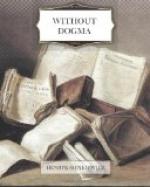If this were all the book offers us one might well wonder why it was written. But its real interest centres in the moment when the cultivated pessimist “without dogma” discovers that the strongest and most genuine emotion of his life is its love for another man’s wife. It is an old theme; certainly two thirds of our modern French novels deal with it; we know exactly how the conventional, respectable British novel would handle it. But here is a treatment, bold, original, and unconventional. The character of the woman stands out in splendid contrast to the man’s. Its simplicity, strength, truth, and faith are the antidote for his doubt and weakness. Her very weakness becomes her strength. Her dogmatism saves him.
The background of the book, its lesser incidents, are thoroughly artistic, its ending masterly in its brevity and pathos; here again is the distinguishing mark of genius, the power of condensation. The man who has philosophized and speculated now writes the tragedy of his life in four words: “Aniela died this morning.” This is the culmination towards which his whole life has been moving; the rest is foregone conclusion, and matters but little.
One sees throughout the book the strong influence that other minds, Shakespeare notably, have produced upon this mind; here its attitude is never merely pessimistic. It does not criticise them, it has absorbed them.
One last word concerning this novel. It does not seek to formulate, or to preach directly. Its chief value and the keynote to its motive lie in the words that Sienkiewicz at the beginning puts into the mouth of his hero:—
“A man who leaves memoirs, whether well or badly written, provided they be sincere, renders a service to future psychologists and writers, giving them not only a faithful picture, but likewise human documents that may be relied upon.”
A human document—the modern novel is this, when it is anything at all. If Mr. Crawford’s canons of literary art are true, and we believe they are, they give us a standard by which to judge; he tells us that the heart in each man and woman means the whole body of innate and inherited instincts, impulses, and beliefs, which, when quiescent, we call Self, when roused to emotional activity, we call Heart. It is to this self, or heart, he observes, that whatever is permanent in the novel must appeal; and whatever does so must live and find a hearing with humanity “so long as humanity is human.” If this be a test, we cannot doubt as to what will be the reception of “Without Dogma.”
A few words concerning the novelist himself. The facts obtainable are of the most meagre kind. He was born in 1845, in Lithuania. The country itself, its natural and strongly religious and political influences, its melancholy, seem to have left their strong, lasting impression upon him. He has a passionate fondness for the Lithuanian, and paints him and his surroundings most lovingly.




